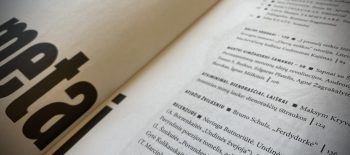Artėjančios 🇵🇱 Lenkijos nepriklausomybės dienos proga rekomenduojame Lenkijos Nacionalinio atminties instituto vadovo Jarosławo SZAREKO straipsnį „Neišsenkanti lenkų dvasia”. Tekstas skelbiamas kartu su Lenkijos nuomonę formuojančiu mėnraščiu „Viskas, kas svarbiausia“, vykdant Nacionalinės atminties instituto projektą.
” Lenkija nuolat atgimdavo. Buvo nenugalima, plėtojo švietimą ir mokslą, ekonomines naujoves, kūrė meną. Ir žadino polėkiams”, – Jarosław Szarek.
Jarosław SZAREK: Uncompromising spirit of Poland
Deprived of our legitimate state, in the nineteenth century we succeeded in constructing not merely a national culture, science and economy but also in creating a state of mind that instilled the thoughts about independent Poland in minds of several generations born in captivity.
In November 1918, a radio telegram announcing the rebirth of the Republic of Poland was disseminated globally reaching many capital cities all over the world from Washington to Tokyo. The announcement notified that the Polish government “will displace the domination of violence that Poland had been doomed to for one hundred forty years.” This indicated the return of independent Republic on the map of Europe, from which it had been moved away at the end of the eighteenth century following the agreement the neighbouring states Austria, Prussia and Russia entered into.
It developed into the symbol itself that the radio telegram on the independent state revival arrived from a place standing for a symbol of a foreign ruling authority – from the Warsaw Citadel erected by Russians in the 1830s following the defeat of the November Uprising where Poles were imprisoned and executed for their disobedience to slavery. One of them, the Commander in Chief, Józef Piłsudski, was imprisoned in the far-famed 10th Pavilion of the Citadel.
„Restoration of Poland’s independence and sovereignty” was possible due to the fact that Poles, at this turning point, demonstrated readiness for foundation of independent state structures and had the strength to defend it effectively in the following years. They were striving for this moment for five generations (starting from 1795) taking steps to bring the independent state into existence.
For over a century, there were many people ready to engage into the struggle to resurrect an independent homeland. Hardly often was this banner carried by many, and they had to face not only invaders, but also compatriots who almost lost the faith in victory, choosing either to remain indifferent or to seek for high treason. How many times during the captivity had they to overcome the bitterness of defeat, when all the circumstances proved that the words „finis Poloniae” were fulfilled?
As early as in 1797 when a hope-sparkling song was composed among the soldiers-emigrants in Italy, who were first to fight in the Polish Legions formed alongside Napoleon and France. The lyrics “Poland has not yet died, so long as we still live…” – became our today national anthem which further lyrics “What the foreign power has seized from us, we shall recapture with a sabre…” provided guidance on armed struggle undertaken in national uprisings. The largest ones, against Russia in November 1830 and January 1863, resulted in bloody repressions, thousands of participants exiled to Siberia, property confiscation, many institutions and laws loss, and the imposition of atrocious Russification.
However, the Polish spirit continued in families, at homes where mothers taught prayers and talked about past, proud history and heroes, praying „Oh Holy Maid, who Czestochowa’s shrine Dost guard and on the Pointed Gateway shine”, making pilgrimages to the holy places of Jasna Góra, Vilnius or Gietrzwałd… The Church maintained the spirit alive and there were always priests sharing the fate of the nation, setting up schools, covering distances to visit insurgents, and finally to Siberia or gallows.
Military defeats and repressions made Poles engaged out of military activity. Opportunities to act in the economic, scientific and educational spheres were sought and victories were achieved. We can find their traces on maps and in scientific publications. The mountains Czerski, Dybowski and Czekanowski were named in honor of the exiled people to Siberia for taking part in the January Uprising. Other example can be found in remote Chile where we can almost everywhere come across the memory mark of Ignacy Domeyko who was an emigrant forced to leave his homeland after the collapse of the November Uprising.
Meanwhile, economic associations, banks, agricultural companies, libraries, and scientific associations were founded in the country, often by former insurgents. Despite repressions, this activity proved the effectiveness in preserving Polish land ownership and the network of their own institutions. There were a lot of people who, although acting on behalf of the partitioning sides, indeed served their homeland.
Despite the fact that the next generations did not live in their own state, they still felt Poles, and were ready to sacrifice for their homeland. Memory and culture persisted due to which a nation deprived of independence expressed. The most outstanding works created during the partition captivity still form the national canon. These include works by great Romantic poets in exile: Adam Mickiewicz, Juliusz Słowacki, Zygmunt Krasiński. Smuggled across borders and banned by censorship, they aroused successive generations of Poles, as did the arch-Polish works by the composer and pianist Fryderyk Chopin, growing out of longing for the country. His music still touches millions of people around the world.
Poland could not be found on the map of Europe when Maria Curie-Skłodowska, as the first Polish woman and the first woman who was awarded the Nobel Prize, called the element she had discovered „polonium” and went the „Polish” presence down into the history of the periodic table system. Two years later in 1905, the Nobel Prize for Literature was awarded to Henryk Sienkiewicz, the author of „Quo vadis?”, who back then was the most widely recognized writer from Russia to the United States. Asked about his homeland, during the Nobel Prize Gala he spoke in the following words: „It was preached dead, and here is one of the thousandth proofs that it is alive It was proclaimed conquered, and here is a new proof that it knows how to win.” A whole host of Poles grew up reading his „Trilogy”. This is a set of novels describing the seventeenth century wars of the Republic of Poland with Turkey, Sweden and the Cossacks, against which the invaders had to fight many times. After the outbreak of World War young people enlisted to join Piłsudski’s Legions or the army formed from among Polish emigrants in the USA. Many of them carried Sienkiewicz’s books in their backpacks. They were willing to fight and die for Poland although even their grandparents had been born when the state had not existed. Poland was also commemorated in the paintings of historical painters. Jacek Malczewski, one of the most unique painters, called: „Paint so that Poland may rise again.” An exhibition of Jan Matejko’s works, one of the most popular of them, was organized in Lviv on the first anniversary the painter had passed away. On the same year, the hundredth anniversary of the Battle of Racławice in 1794 was celebrated. The army which was commanded by Tadeusz Kościuszko, who had earlier fought for the independence of the United States, supported by peasant troops succeeded and defeated the Russians. The victorious battle over the Russians was depicted by Jan Styka and Wojciech Kossak on a monumental (over one hundred meters long) painting which was shown in a specially built rotunda. There were countless groups of Poles flocking through hundreds of kilometers to admire the painting. They would whisper in admiration: “It’s not a painting, it’s a deed indeed”. It is impossible to count how many out of thousands of young people, often from remote villages, became Poles as they jointly created a modern nation, a nation without its own legitimate state, but abounding in culture and customs. They were the ones who not only contributed to Polishness that was able endure, but also they were able instil the same spirit into those whose grandfathers had come from neighbouring countries to Germanize and Russify our country – the country which drawn them into being Poles with its “uncompromising spirit.” It was the spirit that sparkled the deed of the 11th of November, 1918 which brought Poland independence.
Jarosław Szarek
Article published in the monthly Wszystko Co Najważniejsze (Poland) as part of a historical education project of the Institute of National Remembrance



